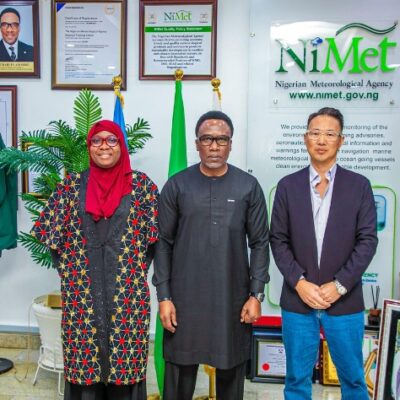
BY OLAPEJU OLUBI
The Director General and Chief Executive Officer of the Nigerian Meteorological Agency (NiMet), Professor Charles Anosike, has flaunted the transformative power of translating meteorological data into actionable insights, so farmers can make climate-smart decisions with confidence and resilience.
Speaking during a Chief Executive Officers breakfast session held on Tuesday, October 16, 2024, in Abuja themed: “Elevating the Role of Data and Information in the National Food Security Conversation”, Anosike stressed the importance of data in bolstering national food security.
The event was organised by the Federal Ministry of Finance, Budget and National Planning and the Nigeria Economic Summit Group (NESG).
According to the NiMET boss, the global food system is increasingly vulnerable to climate change, with developing countries, particularly those reliant on rain-fed agriculture, bearing the brunt of its impacts.
He highlighted the necessity of equipping farmers with precise weather and climate information, enabling them to mitigate the effects of climate change and adapt with resilience, making informed decisions that safeguard their livelihoods.
“NiMet is committed to delivering timely, data-driven solutions to address the evolving challenges of climate change and enhance agricultural productivity,” Anosike said.
“We have witnessed the global consequences of climate change, which no single institution or country can control alone.
Understanding and predicting the complexities of the climate system through meteorology is crucial in supporting climate adaptation and disaster management efforts.”
Professor Anosike further stressed the impacts of climate change on agriculture, noting how it can degrade soil fertility and exacerbate pest and disease outbreaks. He underscored the critical role of meteorological and climatological data in shaping national food security strategies.
“These data underpin various forecasts, from seasonal to short-term, influencing key agricultural outcomes such as the onset and end of the rainy season, rainfall amounts, and dry spells.”
He stated that leveraging climate data is vital for anticipating seasonal variations, which in turn influences agricultural production and the entire value chain.
“By predicting critical elements of the farming season, we empower farmers to optimize their strategies and enhance agricultural resilience,” he said.
Anosike affirmed that the integration of meteorological and climatological data is indispensable for food security, risk assessment, supply chain management, and agricultural research.
“These datasets empower stakeholders—from farmers to policymakers—to make informed decisions, fostering resilience to climate variability while promoting sustainable agricultural practices.”
Also speaking at the event, Dr. Audu Grema, Senior Programme Officer for Agriculture at the Bill and Melinda Gates Foundation, lauded NiMet’s collaborative efforts, recognising the agency’s role in predictive analysis and early warning systems that are essential for effective development planning.





